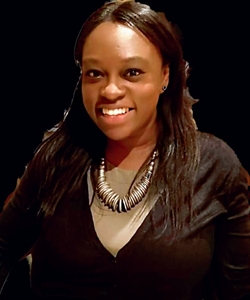 What year did you graduate?
What year did you graduate?
2014
What course did you study?
BSc (hons) Diagnostic Radiography
What is your current role?
Deputy Superintendent Radiographer for Breast Imaging at St Georges Hospital and PHE Professional Clinical Advisor (PCA) for the National Breast Screening Service – London Region
How did you get into your current role?
I was an Assistant Practitioner in mammography before undertaking my Radiography degree. After university, I went straight back into Breast Screening as a trainee mammographer and studied a PgCert in Breast Imaging. After qualification, I worked for two years at Charing Cross and then applied for the job at St George’s. I have been in my current position, which is an even split of managerial and clinical duties, for two and a half years.
St Georges is a National Breast Screening training centre so I completed a postgraduate course at Kingston University to become a Practice educator. I am currently undertaking the Image interpretation and Reporting postgraduate module, also at Kingston, to move into Advanced Practice by participating in mammogram film reading.
The PCA role was advertised within the region and I was selected following an interview process.
Can you describe a typical day?
On a daily basis I could be doing a combination of any of the following:
My clinical tasks involving performing routine mammography in screening clinics, specialist views in symptomatic and assessment clinics or assisting with stereotactic biopsy procedures. As Practice educator I facilitate clinical training for mammography students and conduct tutorials.
On the management side I assist the Superintendent in line management of the radiographers and assistant practitioners which includes supporting staff, preparing rotas, attending meetings, ordering stock, conducting appraisals, resolving equipment problems, conducting audits, writing protocols and responding to client feedback.
My PCA role involves providing expert advice, auditing other breast screening services and supporting national work to develop the breast screening service. This can involve attending meetings, teleconferences, responding to emails or writing reports and documents.
What do you enjoy about your role?
The variation due to the clinical/managerial split of my role; every day is completely different from the previous. This is occasionally challenging but always exciting.
I am passionate about the National Breast Screening Service so everything I do is aimed at providing a better service for our patients and a happy working environment for everyone in the department.
I have been very fortunate to work in a department where opportunities for professional development exist as a result of the four-tier structure within radiography to tackle national workforce issues and promote role extension.
What do you find challenging in your current role?
There are a lot of things that I would like to do to improve the service for staff and patients, but I am unable to, due to lack of resources or funding. Usually, I try to find ways to improvise or wait patiently.
What advice would you give to a current student at St George’s who is keen to get in to a similar area of work as you?
Breast Imaging can be a very repetitive and physically demanding job, but a great team culture exists within departments and it is a very rewarding job.
The sky is the limit in breast screening when opportunities arise, as long as you are willing to put the work in. If you are happy to continue with academia after your degree then go for it.
Which aspects of your degree are relevant for your current role?
The combination of all of the modules allows you to become a well-rounded radiographer with great technical and academic skills. The inter-professional modules are the perfect introduction into multidisciplinary team working in breast imaging. I use reflective practice daily to improve patient and staff experiences and enhance professional development.
What would you say were the best / most challenging things about your degree?
The support from the academic tutors and their first-hand knowledge of the clinical environment was the best thing about the degree. The most challenging thing for me was the fact that I was a single parent returning to full time study as a mature student.
If you could go back to your time at St George’s, would you do anything differently?
I would enjoy the student experience a bit more and be more assertive and proactive during clinical placements.
Do you have any advice or a message for current students at St George’s?
Enjoy every minute of your time at Georges; it is a fantastic place to learn.
Do you have any advice or a message for students considering studying at St George’s?
Apply to St Georges, work hard and have fun!